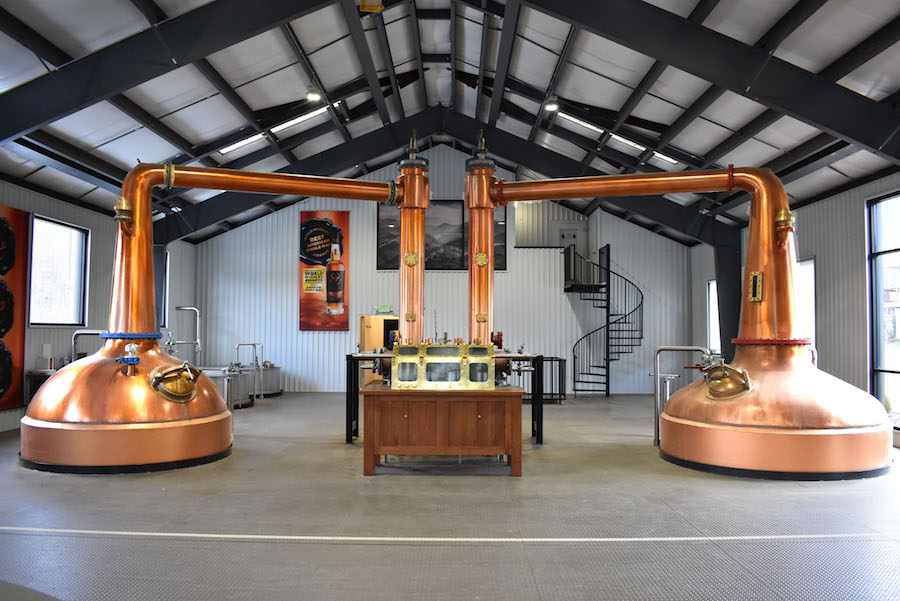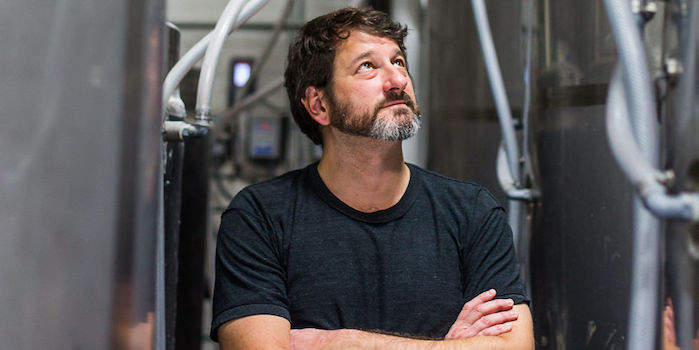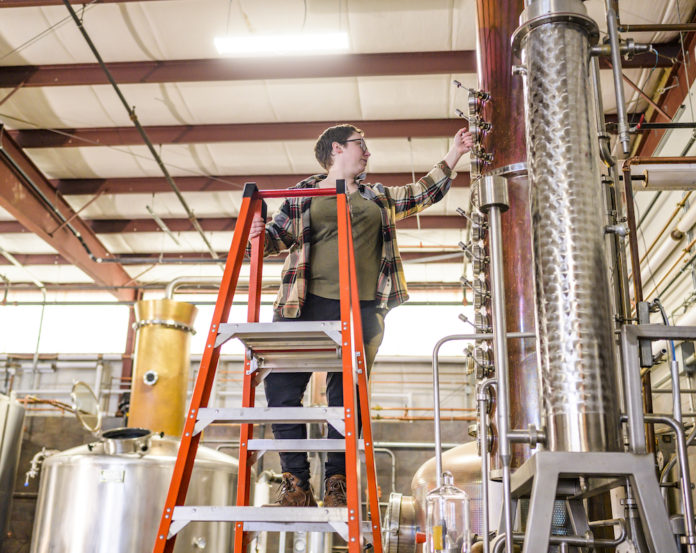The U.S. craft spirits industry was booming before COVID-19 gripped hold of the globe. Consumers flocked to distillery tasting rooms across the country. U.S. spirits sales grew 5.3% last year, reaching a record high of $29 billion, according to the Distilled Spirits Council of the United States. Sales of higher-end bottles alone increased 8% in 2019.
What a difference time makes. Now with so many businesses closed down, and a growing number of Americans ordered home unless absolutely necessary, how can craft distillers weather this unprecedented storm?
“This is going to be a serious challenge for craft distilling,” says Maggie Campbell, president of Privateer Rum and board member on the American Craft Spirit Association (ACSA). “Small distillers and independently held distillers often lack the financing for months of lost revenue. Many rely on public tours and public tastings to introduce and excite people about their products. For us, our local restaurant industry is our heartbeat, and all bars and restaurants have been shut for a number of weeks as of now.”
First, The Bad News
Perhaps the scariest part of this whole situation is the unknown.

“With all areas impacted, from market partner impacts to on-site Visitors Center impacts, it’s too early for us to tell what the full picture will really look like, particularly because the timeline is unknown for all of this,” says Virginia Distillery Co. CEO Gareth E. Moore, who’s also president of the Virginia Distillers Association and serves on the DISCUS Craft Advisory Council. “Most distilleries are probably in a similar situation, where it is literally day-by-day.”
Some producers have already shutdown temporarily. Four Roses announced a cessation of operations until April 6, at the earliest. Leading craft distillery Few Spirits has also paused production for at least two weeks.
“Sadly, many [distilleries] won’t make it, and the devastation of business will knock many distilleries out of business,” says Paul Hletko, Few co-founder, and former ACSA president. “Many are already struggling already due to other issues, and won’t survive.”
The middle tier — distributors and wholesalers — also face a crunch due to COVID-19, which could cause another shakeout. “We could be left with just the large distributors, who will focus on their biggest suppliers, and rightfully so,” says Dave Schmier, owner of Proof and Wood Ventures, and former owner of Redemption Rye.
This also raises the question of which brands will thrive during the crisis. “Consumers will fall back onto the brands that they know best,” says Schmier.
Or they will fall back onto whatever brands are simply present on the day that frightened people visit their local liquor store.
“I believe that people’s buying decisions will become less-sophisticated,” says Dr. Pietro Bortolotti, CEO of Catskill Distilling. “It’ll be more grab-and-go. They won’t be shopping around. They won’t be shopping based on reviews or labels.”
While liquor stores remain open as essential businesses in most states, the necessary closing of bars and restaurants has turned off a major source of sales for most distilleries. And even after COVID-19 eventually clears, the on-premise industry faces a rocky road back.
“This is devastating on so many levels for them,” says Schmier of Proof and Wood Ventures. “Even well-financed operators are in a lot of trouble. Many of these businesses are run by people with incredible passion, but not a lot of money. Even in the best of times, many of these people were living month-to-month, or even day-to-day.”
Schmier and others involved in the production side expressed their deep condolences and concerns for the on-premise industry.
“First and foremost is being supportive to anything we can assist with while their operations are in complete shutdown,” says Moore. “The concern is for these account partners and the livelihood of the people who work in those on-premise locations. They are going to need support from the entire industry and beyond.”
The Industry Adapts, Waits
Moore points out an issue caused by the Coronavirus at liquor stores allowed to remain open. “Tasting activity, which we rely heavily on, is also clearly on hold,” he says.
But there is an alternative.
“In some markets, we are seeing dry tastings as a replacement to help support the account, as well as the brands, during this time,” Moore adds. “Dry tastings are an alternate to traditional sampling where there is no liquid product involved, but we are able to still discuss the product offerings with consumers as you would in a traditional tasting setup.”
Which is to say that craft distilleries have adapted to these strange and dangerous times.
While taprooms are shuttered, the production side of many businesses remains open — albeit with less staff. Virginia Distillery Co. is still making whiskey, with the “safe social distancing” of employees, Moore says.

“We are in motion to launch our flagship American Single Malt Courage & Conviction and we’re excited for the opportunity to get this new whisky into the market in just a few weeks,” he adds.”
Privateer also remains up and running.
“As of now our distillery is paired down to two members of our essential staff,” Campbell explains. “They both live in situations where they are not in contact with others, and do not have a high risk of spreading anything between each other or beyond their own homes. They are very grateful to have a task and share a space where they can laugh and sing and feel normal for a while each day.”
“We are being extra cautious with our safety because I feel like people’s minds are often somewhere else right now,” she adds. “I would hate for there to be an accident because someone was distracted or understandably upset by the current situation. We’re taking it one day at a time right now.”
Many distilleries have begun making hand sanitizer, as the crisis causes shortages in cleaning products. Distilleries, like breweries and wineries, have also been able to sell bottled alcohol products onsite via curbside pickup. And while other parts of the industry have been greatly affected, Hletko of Few Spirits sees glimmers of hope ahead.
“Survivors will come out stronger than ever,” he says. “Any ‘exits’ are probably delayed [i.e. selling the company], and I’ll bet several new developments get shelved as investment dollars get tighter. But survivors will be stronger, and the renewed focus on ‘buy small’ will likely help as time goes on and the new normal starts, whatever that looks like.”

Time is also the ally of distilled spirits.
“My business is largely comprised of whiskey that’s aging,” says Schmier of Proof and Wood Ventures. “The optimist in me says that it’s all getting better while we wait this out.”
Social Media is Key
With so many people stuck at home, distilleries have increasingly turned to social media during this crisis to remain connected — and generate sales.
Distillery 291 in Colorado has suddenly become a production studio. Using Facebook Live and Instagram TV, the company has recently broadcast more video programming. This includes local bartenders brought in to teach viewers how to make cocktails, as well as local comedians who otherwise were out of gigs.
“We’re just trying to entertain people,” says Distillery 291 Founder Mike Myers. “Every day we think of new things to create content.”
This has also allowed the company to keep on staff, as sales and production employees shift roles into social media.
“Are we freaking out right now? Yes,” says Myers. “But so far, it’s looking good here. We’re staying in production. Our facility is big enough for everyone to keep six feet away from each other.”
Privateer has also tapped into social media.
“We’ve begun to partner with bartenders who are furloughed on social media to support home drinkers in their craft,” says Campbell. “Our Instagram @privateerrum is sharing videos where bartenders offer recipes and technique for people to drink while at home, and we are listing the bartender’s Venmo and asking people to tip the bartender for sharing their hospitality and knowledge with them at home.”
“We’re hoping to use our network as a way to connect people wanting to drink well at home and bartenders who love to share their craft and are looking for some income,” she adds.
Looking Ahead
Several countries at or near the original Coronavirus epicenter have recently reported lower infection rates. This points to a world beyond COVID-19, even as the virus ravages the rest of the globe.
“I think it’s critical that distilleries take the long view and understand there will be a recovery, and when there is, there will be opportunity to see their customers and their market in a new light,” says Campbell. “We are taking this time to do many of the projects that we were often too busy to do, and look after and tend to those impacted on the front lines, such as our partners in hospitality, and employees in the restaurant industry and service industry as a whole.”
Kyle Swartz is editor of StateWays magazine. Reach him at kswartz@epgmediallc.com or on Twitter @kswartzz.










